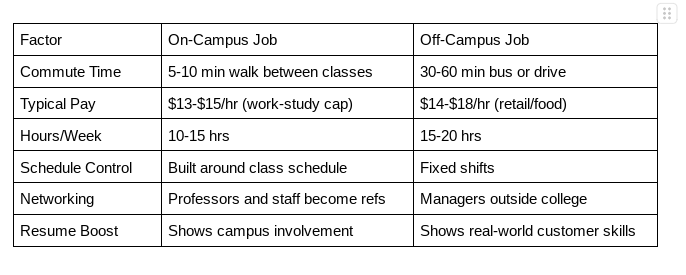On-Campus vs Off-Campus Jobs: Pros, Cons, and How to Choose

For four semesters, I spent four unpaid hours a week on the bus to my weekend job: 50 minutes out, 50 back, plus 20 more shivering in –40 °C snow or sweating under the August sun. This term, I switched to a campus job (and moved into a dorm). Now, my “commute” is a five-minute walk, and the paycheck still shows up. The perks? More comfort, more study time, and a boss who understands exam week.
Hey there! Welcome back to Being College Savvy. Today, we’ll weigh the pros and cons of on-campus vs off-campus jobs and hand you a five-question checklist to pick your best fit.
Heads-up if you commute: You don’t have to live in a dorm for an on-campus job to pay off. Most campus roles run Monday to Friday between classes, so the only trip you make is your regular ride to lectures. No second bus trip.
Before we take a closer look at the pros and cons of working on-campus vs off-campus, let me quickly run through the common types of jobs students usually get in both. Common positions available to students on campus are undergraduate research assistant, library assistant, peer mentor, resident assistant, campus tour guide, dining services staff, fitness center attendant, event staff, IT help desk support, writing center consultant, tutor, peer health educator, student career services ambassador, and graphic design assistant.
The options for on-campus student employment positions are endless, but the most common similarity among these positions is that students are treated as students first and foremost.
On the other hand, off-campus jobs are your classic part-time gigs: working retail, food service, or delivery.
Also worth noting: on-campus jobs are often more adaptable for international students, depending on visa rules at your school.
So, what are the advantages of working on campus? Let’s take them one by one.

ADVANTAGES OF AN ON-CAMPUS JOB
1. COMMUTE:
Working an on-campus job means no extra travel; you stroll 5-10 minutes from classes to your shift. In contrast, working an off-campus job means you have to commute 30-60 minutes each way, resulting in up to four hours of lost study time weekly (assuming you work two days a week).
I didn’t realize how much work I could get done in those four hours until I took two weeks off. Those reclaimed hours allowed me to catch up on the courses I needed extra time to understand. That mini-experiment convinced me that getting a job on campus would be perfect for me!
2. Academic Edge:
Student employment positively correlates with study time, persistence to a degree, and student success. On-campus employment has a positive influence based on the nature of on-campus experiences; the students who work on-campus usually gain an enhanced ability to be involved on-campus and have further opportunities within the educational institution. Working on-campus (for a maximum of 15 hours) also positively impacts student’s GPA, retention, involvement, and opportunities within their institution.
In contrast, according to research, Off-campus work, both full-time and part-time, is negative because it often does not provide experiences or skills relevant to the student’s field of study or needed for their career progression.
3. Schedule Control:
Another advantage of working on-campus is that on-campus positions are scheduled per the students’ classes and studying requirements. You do not have to worry about cancelling shifts or sending a new schedule to your manager each exam season.
Most on-campus jobs request for your class schedule at the start of each semester to work with your schedule, unlike off-campus employment, where it can be harder for your supervisors to adjust schedules based on your academic needs.
4. Networking/Career and Resume Impact:
One reason students choose to work while studying is to gain relevant experience that is beneficial for their future careers and competitiveness in the labour market. Students working on-campus (or who partake in off-campus co-op placements) are provided opportunities to practice collaboration, teamwork, and technical skills that are useful in their future work environments.
Research also shows that on-campus student employment is an investment in job skills, knowledge, and experience and generates higher labour market outcomes post-graduation. Also, students who are employed in roles related to their field of study are more positively impacted than students employed in positions not related to their field of study, as is usually the case with most off-campus employment.
Although some students who work off-campus enjoy these perks at their off-campus jobs, it is important to note that most do not have these perks.
While on-campus jobs have the impressive perks listed above, they are not perfect. Sometimes, you need the extra paycheck or do not care much about your grades or being competitive in the job market post-graduation. So, let’s talk about the wins of working off-campus.
1. Pay and Overtime:
Off-campus jobs tend to pay higher than on-campus jobs. Additionally, there are usually opportunities to earn more when you work overtime or on statutory holidays. When you work on-campus, you generally get paid less, and overtime is uncommon.
Although, apart from hourly wages, on-campus positions can include academic credit.
2. Hours:
Compared to working on-campus, when you work off-campus, you have the opportunity to work for more hours: longer weekday shifts, weekends, holidays and overtime. Working for more hours also correlates with having a bigger paycheck!
3. Job Availability & Variety:
Even though the job market isn’t great right now, there are always more job openings for off-campus work, various places/work environments to choose from, and less competition compared to on-campus jobs. On-campus jobs usually have limited slots, making them harder to obtain, and your work environment, regardless of the department you work in, will still be within your school premises.
4. Skills:
While it is true that most on-campus jobs equip you with skills needed to thrive in your future career, off-campus jobs also do the same (depending on your field of study) but in a different way. Off-campus jobs provide real-world customer soft skills, such as interacting with dozens of strangers (face-to-face), whether you work in retail, food, or similar jobs.
Also, for some fields of study, such as community and health science or medical programs, you are better off working off-campus to gain relevant skills.

Are you still unsure whether to choose an on-campus or off-campus job? Below is a five-question decision checklist. Answer the questions honestly. The option with more “Yes” might better fit you.
1. Will commuting add more than 3 hours to your week?
Yes → On-campus might be better
No → Off-campus could still work
Off-campus jobs often mean 30–60 minutes of extra travel each way, which adds up to 3–4 lost study hours a week.
2. Do you need the highest possible hourly pay right now?
Yes → Off-campus wins on income
No → On-campus may still be worth it
Retail and food jobs typically pay $2–$4 more per hour but also factor in commuting costs and time.
3. Are you taking a heavy course load (4+ classes or challenging STEM subjects)?
Yes → On-campus likely fits better
No → You might manage either just fine
Campus supervisors usually give you flexibility during exams. Off-campus jobs may not be as understanding.
4. Do you want this job to help your resume or future career?
Yes → On-campus has better long-term value
No → If it’s just about the money, either works.
Many campus jobs lead to professor references, networking, or leadership skills you can use later.
5. Do you need a job with flexible hours built around your class schedule?
Yes → On-campus offers more flexibility
No → You’re okay with less flexibility, evenings and weekends.
Bonus Question: Will this job drain your energy more than it refills your bank account?
Yes → Might be time to reassess
No → You’ve probably found your balance
If it’s costing you rest, peace of mind, or grades, it may not be worth it—on or off campus.
Do you have any other factor that helped you choose between working on-campus or off-campus? Please share them in the comments!
Thank you for reading!





